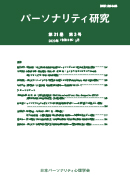Volume 31, Issue 3
Displaying 1-9 of 9 articles from this issue
- |<
- <
- 1
- >
- >|
Original Article
-
2022Volume 31Issue 3 Pages 137-147
Published: November 25, 2022
Released on J-STAGE: November 25, 2022
Download PDF (428K) -
2022Volume 31Issue 3 Pages 148-158
Published: November 25, 2022
Released on J-STAGE: November 25, 2022
Download PDF (473K) -
Period, Birth Cohort, and Age Effects on the Social Desirability of Personality Trait Words in Japan2022Volume 31Issue 3 Pages 166-176
Published: December 22, 2022
Released on J-STAGE: December 22, 2022
Download PDF (406K) -
2023Volume 31Issue 3 Pages 180-190
Published: February 24, 2023
Released on J-STAGE: February 24, 2023
Download PDF (514K)
Short Report
-
2022Volume 31Issue 3 Pages 159-162
Published: November 30, 2022
Released on J-STAGE: November 30, 2022
Download PDF (341K) -
2022Volume 31Issue 3 Pages 163-165
Published: December 05, 2022
Released on J-STAGE: December 05, 2022
Download PDF (264K) -
2023Volume 31Issue 3 Pages 177-179
Published: February 24, 2023
Released on J-STAGE: February 24, 2023
Download PDF (291K) -
2023Volume 31Issue 3 Pages 191-193
Published: February 24, 2023
Released on J-STAGE: February 24, 2023
Download PDF (380K) -
2023Volume 31Issue 3 Pages 194-196
Published: February 24, 2023
Released on J-STAGE: February 24, 2023
Download PDF (316K)
- |<
- <
- 1
- >
- >|
